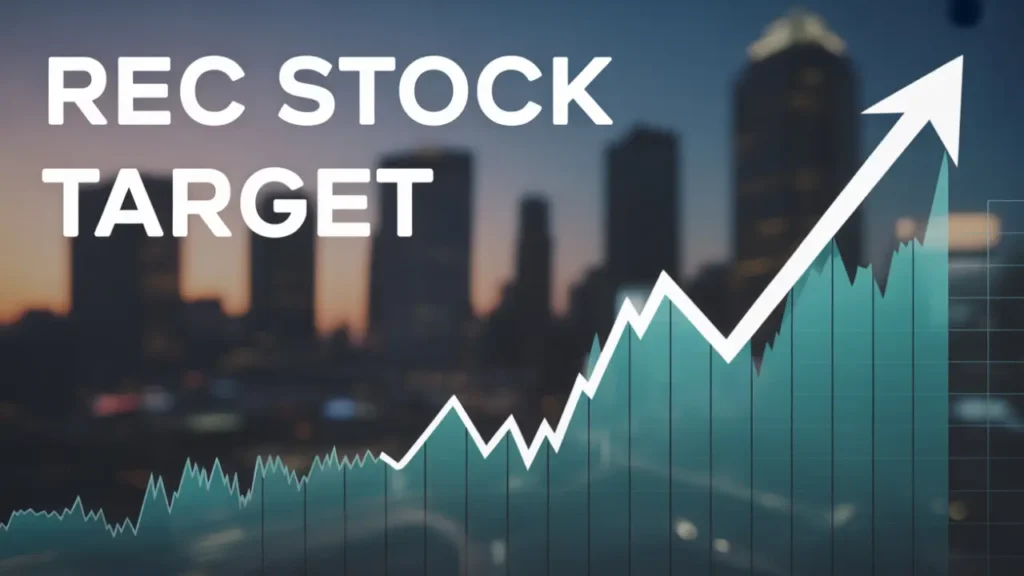REC Limited (formerly Rural Electrification Corporation) has long been a pillar of India’s power financing sector. As a public sector financial institution, it plays a crucial role in providing funding for electricity and infrastructure projects across the country.
Recently, the company has caught the attention of investors due to its sharp stock price correction, robust financial results, and ambitious plans for green energy. Despite the current market challenges, analysts continue to view REC as a company with long-term growth potential.

REC Share Price and Returns
As of late August 2025, REC’s share price has been under pressure, trading close to its 52-week low of ₹348.60. This is a steep decline compared to its 52-week high of ₹636.00. The fall reflects broader market conditions and short-term selling pressure, which has resulted in negative returns for investors over the past year.
However, when viewed from a long-term lens, REC has delivered extraordinary performance. Over the last three years, the stock has gained more than 228%, and over five years, it has surged by nearly 320%. This impressive growth shows that the company has consistently rewarded patient investors. While the present correction may cause concern for some, market experts point out that such volatility is common and does not undermine REC’s strong fundamentals.
REC Share Latest Financial News
REC’s financial health remains solid despite short-term fluctuations in its stock price. In Q1 FY26, the company reported its highest-ever quarterly profit of ₹4,451 crore, marking a 29% increase compared to the same period last year. This record-breaking performance highlights the company’s operational efficiency and effective capital allocation.
The company’s loan book also grew significantly, expanding by 11% year-on-year to reach ₹5.67 lakh crore. This growth reflects REC’s strong role in financing India’s power and infrastructure projects. In FY25, REC’s total income increased by 19% to ₹55,980 crore, while its profit after tax (PAT) rose 12% to ₹15,713 crore. These results indicate not only stability but also continued growth potential, giving investors confidence in its long-term trajectory.
Moreover, REC has consistently rewarded shareholders with dividends. The company recently declared a dividend of ₹4.60 per share, underlining its focus on shareholder value. Alongside financial success, REC has also received recognition through awards like the Golden Peacock Award for Excellence in Corporate Governance and the Best Design Thinking Award, further establishing its reputation as a responsible and well-managed enterprise.
Strategic Focus on Green Energy
A major highlight of REC’s strategy is its increasing focus on renewable energy and sustainability. During its 56th Annual General Meeting (AGM), Chairman and Managing Director Jitendra Srivastava stressed the company’s commitment to aligning with India’s clean energy goals.
REC plans to increase its exposure to green energy projects by nearly ₹2.5 lakh crore by 2030. The aim is to expand its overall loan book to ₹10 lakh crore by the same year, with a strong emphasis on renewable energy, electric mobility, and other sustainable infrastructure initiatives.
This strategic move not only supports India’s vision of reducing carbon emissions but also positions REC as a key financier in the energy transition. Experts believe this focus on ESG (Environmental, Social, and Governance) principles will attract long-term institutional investors and enhance the company’s global credibility.
Analyst Recommendations and Market Outlook
Despite the recent fall in share price, analysts remain optimistic about REC’s prospects. Many brokerage reports have given the stock a “Strong Buy” or “Buy” rating, citing its solid financials, high dividend yield, and future growth in renewable financing.
Price targets for the stock vary, with some analysts projecting levels of around ₹514.71, while others have gone as high as ₹600. Given the current price near its 52-week low, these targets suggest a strong upside potential. Analysts argue that the current dip presents a buying opportunity for long-term investors.
With a robust balance sheet, strong profit growth, a proven track record of dividends, and a clear roadmap toward green energy, REC Limited continues to stand out as a leading player in India’s financial and power sector landscape.
F.A.Q.
– What is REC Limited and what does it do?
REC Limited (formerly Rural Electrification Corporation) is a public sector financial institution that provides loans and financial support to India’s power sector, including renewable energy, transmission, and infrastructure projects.
– Why has REC’s share price fallen recently?
REC’s share price has corrected due to overall market volatility and profit booking. Despite this short-term weakness, the company’s long-term performance and financials remain strong.
– What are the future growth plans of REC?
REC plans to grow its loan book to ₹10 lakh crore by 2030, with nearly ₹2.5 lakh crore dedicated to renewable energy and green projects. The company is aligning with India’s clean energy goals.
– Is REC Limited a good stock to invest in?
Many analysts consider REC a strong buy due to its record profits, consistent dividend payouts, and focus on green energy financing. Price targets range between ₹514 and ₹600, suggesting potential upside.
– Does REC pay dividends to shareholders?
Yes, REC has a strong track record of paying dividends. Recently, it declared a dividend of ₹4.60 per share, showcasing its commitment to rewarding investors.
Also read:-